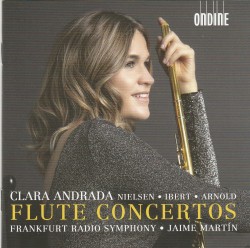 Nielsen; Ibert; Arnold – Flute Concertos
Nielsen; Ibert; Arnold – Flute Concertos
Clara Andrada; Frankfurt Radio Symphony; Jaime Martin
Ondine ODE 1340-2 (naxosdirect.com)
What a good idea to trace the dramatic transition from Romanticism to Modernism through flute concerti by three composers of three consecutive generations: Carl Nielsen, born in 1865, Jacques Ibert, born in 1890 and Sir Malcolm Arnold, born in 1921. The age differences notwithstanding, all three concerti were written in the 28 years from 1926 to 1954.
The first movement of the Nielsen concerto (1926) seems to me to capture this strange and abrupt transition, opening with a stormy – modernist – flourish by the orchestra, answered by a long, lyrical melody, which could almost have been written by Nielsen’s Romantic predecessor, Carl Reinecke. The angular second subject, however, is without argument the product of a 20th-century sensibility, most effectively played, I might add, with calm rhythmic stability by soloist Clara Andrada.
Similarly the second movement of Ibert’s concerto (1932) begins with a long sustained melodic line, played with great grace and refinement by Andrada, before becoming progressively more disquieted, reflecting perhaps the growing tensions and anxieties of the late 1920s and early 30s.
The third movement of Arnold’s Flute Concerto No.1 (1954), fast, short, exciting – and tonal – is unquestionably a product of the 20th century. Arnold’s skill as a composer is very much in evidence in this movement, as he builds energy and excitement through the alternation of soloist and orchestra.
I must commend conductor, Jaime Martín, a flutist himself, and the Frankfurt Radio Symphony, for their exemplary rapport with the soloist – musical teamwork at its best.



